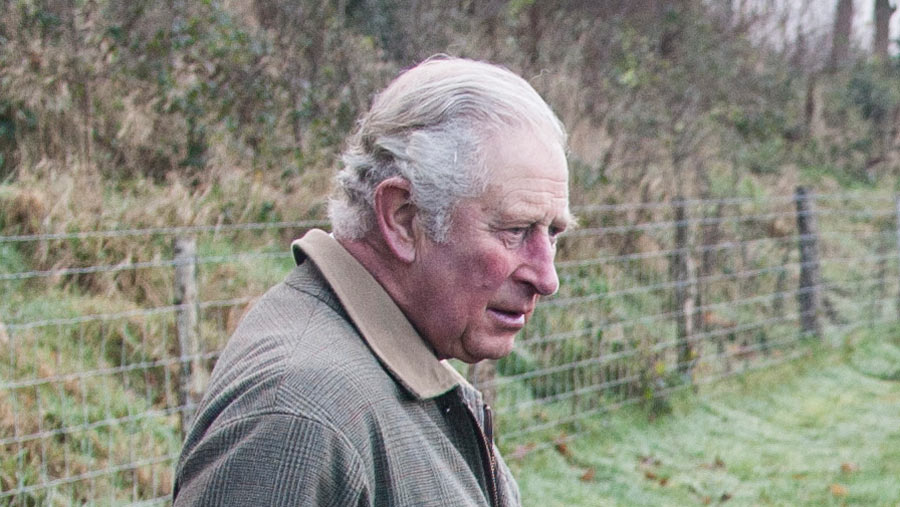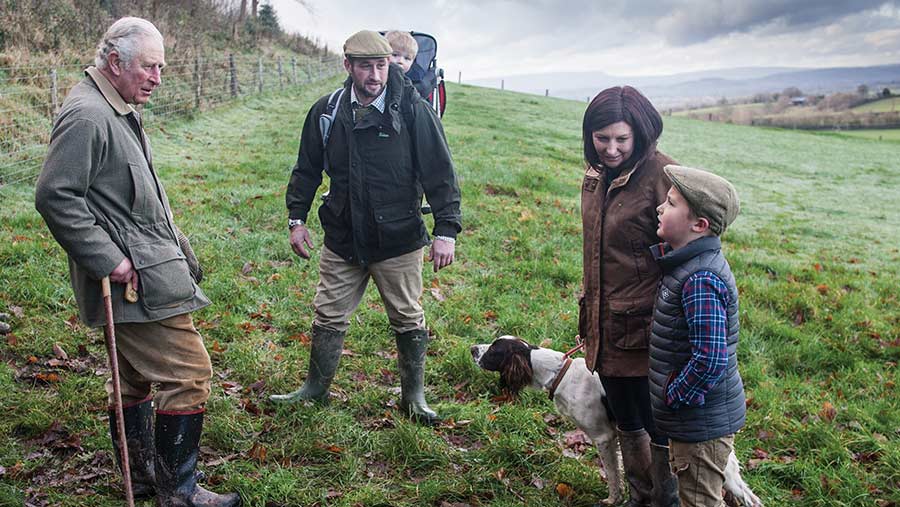HRH The Prince of Wales on FW Award and farming’s future
 © Charles Sainsbury-Plaice
© Charles Sainsbury-Plaice HRH The Prince of Wales, recipient of Farmers Weekly’s Lifetime Achievement Award 2020, sets out his vision for agriculture in the decades to come.
I was surprised and extremely touched that Farmers Weekly wished not only to honour me with a Lifetime Achievement Award, for which I am most grateful, but also to provide me with this opportunity to share some thoughts on what the future might hold for this country’s small family farms.
I have been doing what little I can to support farming communities and promote the importance of sustainable landscapes throughout a 50-year period that has seen enormous changes for everyone involved with producing the food on which we all rely.
During that time, I have been constantly amazed and heartened by the resilience, adaptability and ingenuity of the family farms that still form the backbone (and quite a few other bones, too) of our rural communities.
Yet it is all too clear that even bigger changes are needed as we transition rapidly – as we must if we are to survive – to a world in which sustainability becomes a central organising principle.
Global challenges
In this new world, the relationship between farmers and carbon, water and biodiversity, will be of fundamental importance, with bigger challenges and new opportunities.
So it is often unhelpful, perhaps, that much of the language being used to describe the situation and the potential remedies is so obscure, sometimes appearing as if it has been chosen to hide the real message and alienate those who most need to hear it.
The simple, terrifying assessment is that, at a global level, the sum of all the commitments made by countries to reduce carbon emissions is not sufficient even to come close to limiting global temperature rises to 2 degrees, let alone the 1.5 degrees that climate scientists regard as the safe maximum.
Rather, they deliver a 3.2 degree increase, which means mass extinctions and large parts of the planet being uninhabitable by the end of the century.
This is precisely why the urgency is so great to decarbonise our entire global economy, including conventional agriculture as a major emitter.
At the same time, the soils that we rely on for food production are becoming degraded, and their productive capability exhausted, due to erosion by wind and water, intensive chemical applications and insensitive management practices.

The Prince with Duchy of Cornwall tenants the Stables family in Herefordshire © Charles Sainsbury-Plaice
Vital resource
Topsoil is an incredibly precious resource for any society. In addition to its role in much of our food production, it holds three times as much carbon as the atmosphere and, when its fertility is restored through replacing lost organic matter, it reduces the risk of flooding by absorbing water.
So this is not a commodity that we can use up and replace at will. Degraded soils store less carbon and host fewer of the micro-organisms that drive the natural processes which underpin healthy plant growth.
Over the course of several generations, and in the laudable interests of feeding a growing population, we have consistently been taking out more than we have put back – in both carbon and natural fertility.
In plain English, this situation is simply not sustainable – we cannot go on as we are. This is perhaps the most important reason why farming and rural land management is facing the biggest shake-up in decades.
Big opportunities
I believe that the urgent need to tackle these problems also presents the biggest new opportunities for farmers, including the smaller family farms, since the Second World War.
Of course, the irony hasn’t escaped me that for most of my lifetime (and through no fault of any of us), the economic climate in which all farmers operate – along with the signals and incentives they have been given – have been such that, in terms of greenhouse gas emissions, soil health and biodiversity, the wrong thing has often paid and the right thing hasn’t!
At last, however, it appears that the signals are beginning to change and thus there are opportunities as well as challenges.
Taking full advantage of these new opportunities will require an innovative mindset, almost certainly much more collaboration and a willingness to do things differently.
Farmer innovation
Many farmers are already showing what can be done, and I have been greatly impressed to see so much ingenuity on my farm visits around the country – be it a shift to low disturbance means of cultivation to improve soil health and build stocks of carbon, diversification into specialist crops, or establishing direct-to-market supply chains of local produce.
It takes enormous courage to step away from the “way it has always been done” and into something new, but the results can speak for themselves.
For the past six years, my Countryside Fund’s Farm Resilience Programme has supported more than 1,000 farm businesses as they review their operations to understand what makes their businesses tick, and what they and their family want from the future.
The programme has demonstrated that taking time off-farm to lead and manage through planning and benchmarking builds solid foundations for every business – and pays dividends in the confidence of a family to implement change.
New approach
As we begin the transition to new approaches to farming, taking time to assess the business as a whole, including its environmental assets, is an essential step. This includes rethinking existing assets from new perspectives.
To give just one example, repairing a drystone wall on your land not only provides secure containment for your livestock, but could contribute to the overall landscape character or direct a public right of way.
The repair might even provide paid work for your local community. There is also now every reason to consider whether we can discover new “assets” that could be put to use, such as the natural capital asset of restoring lost natural habitat on “unproductive” parts of a farm.
For instance, across the Duchy of Cornwall, we are auditing every farm to identify where such improvements can be made.
Environmental gains
Meanwhile, the private sector is increasingly becoming organised around these issues, creating schemes to offset the inevitable carbon emissions and wildlife impacts of development activity, by investment into schemes that will capture carbon and deliver other environmental gains.
These are still early days, but it is clear that there are exciting new partnerships to be made between farmers, businesses and utility companies, bringing opportunities for those that seek them.
Alongside a strong focus on sustainability, it is clear that maintaining the highest possible standards of welfare is essential. There is a growing consumer interest in high-quality food and in the story that links the product to its source, or to a specific native breed.
For smaller producers in particular, the opportunities for selling high-quality produce, with strong provenance and a good authentic story, directly to discerning consumers have never been greater.
Those discerning consumers are also likely to take the greatest interest in supporting farm businesses that are making a real environmental and social commitment to using less energy and chemicals and to capturing carbon in their soils.
It is particularly encouraging to see smaller family farms taking an active part in the wide range of partnerships that are developing around tackling these issues.
Exchanging ideas
Working with neighbours in local groups or clusters brings exchanges of ideas and experience, economies of scale in tackling common issues and valuable opportunities for collective marketing.
I think this is a really important approach and my Countryside Fund is doing its best to commend it to those who find themselves struggling alone against what can often seem overwhelming odds.
Improved dialogue between sectors is also important, so I am delighted that some water companies are increasingly engaging with farmers and other landowners to tackle issues of water quality and quantity in an integrated way across river catchments.
Seeking new ways to deal with problems at source, preventing pollution, mitigating flooding and drought, and improving the quality of much-loved rivers makes good business sense as well as benefiting nature and local communities.
Adapt and thrive
With so much change beginning to sweep through all aspects of food production, it is clear that an innovative approach and energy will be required to navigate the path ahead.
I have no doubt in British farmers’ ability to adapt and thrive in changed circumstances, as long as they are provided with the right advice and in the most timely fashion.
As the American farmer and poet, Wendell Berry, noted: “A good farmer is a craftsman of the highest order.” The need now is for a different sort of craftsmanship, ensuring that the nation is farmed in a way that tackles the new challenges robustly, such that the people of this country can be justly proud and future generations will have reason to be thankful.
